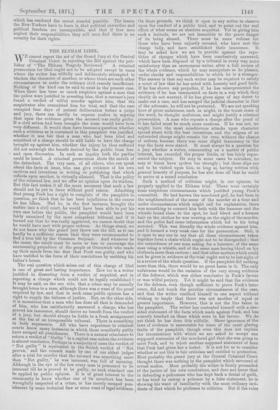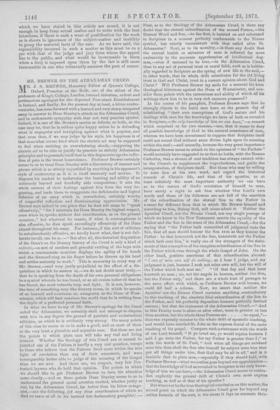THE ELTHAM LIBEL.
WE cannot regret the act of the Grand Jury at the Central Criminal Court in rejecting the Bill against the pub- lisher of " The Eltham Tragedy Reviewed." A criminal prosecution for libel ought not to be adopted except in cases where the writer has wilfully and deliberately attempted to blacken the character of another, or where there are such other circumstances as make the ordinary civil remedy insufficient. Nothing of the kind can be said to exist in the present case. When there has been so much suspicion against a man that the police wore justified in arresting him, that a coroner's jury found a verdict of wilful murder against him, that the magistrates also committed him for trial, and that the case occupied four days of patient deliberation before a judge and jury, there can hardly be express malice in arguing that upon the evidence given the accused was really guilty. If a civil action had been brought the issue would have been very different. It would then have become a question whether such a criticism as is contained in this pamphlet was justified, whether it was fair that a man who had been tried and acquitted of a charge should be still liable to have the charge brought up against him, whether the injury he thus suffered did not outweigh the benefit derived by the public from free and open discussion. In such an inquiry both the parties could be heard. A criminal prosecution shuts the mouth of the defendant. The very man, of all others, who can speak about the facts at issue, who can give evidence of his own motives and intentions in writing or publishing that which reflects upon another, is virtually silenced. That is the policy of the criminal law, and we offer no opinion upon its wisdom. But this fact makes it all the more necessary that such a law should not be put in force 'without good reason. Admitting that young Pook has a right to complain of the pamphlet in question, we think that he has been injudicious in the course lie has talon. Had he, in the first instance, brought the matter into a civil court, he would have been able to put his own case before the public, the pamphlet would have been fairly examined by the most competent tribunal, and if it turned out that he was really aggrieved, we cannot doubt that he would have met with proper redress. As things stand, we do not know why the grand jury threw out the bill, as it can hardly be a sufficient reason that they were recommended to find a true bill by the Common Serjeant. And whatever be the cause, the result must be more or less to encourage the unreasoning prejudices of the people at Greenwich who made up their minds from the first that Pook was guilty, and who have testified to the force of their convictions by mobbing his father's house.
The real question which arises out of this charge of libel is one of great and lasting importance. How far is a writer justified in dissenting from a verdict of acquittal, and in repeating a charge which could not be legally established I It may be said, on the one side, that a crime may be morally brought home to a man, although there was a want of the proof required by law, and that in such cases public opinion has a right to supply the failures of justice. But, on the other side, it is monstrous that a man who has done all that is demanded of him, who has satisfactorily answered a charge, who has proved his innocence, should derive no benefit from the verdict of a jury, but should always be liable to a fresh arraignment at the bar of an irresponsible tribunal. There is something in both arguments. All who have experience in criminal courts know many instances in which those manifestly guilty have escaped all punishment. There is a natural reluctance to return a verdict of " Guilty " in a capital case unless the evidence is almost conclusive. Perhaps in a majority of cases the verdict of " Not guilty" is equivalent to the Scotch verdict of " Not proven," and the remark made by one of our ablest judges after a trial for murder that the accused was something more than "Not guilty," he was innocent, was full of meaning. Although in the eye of the law every man is presumed to be innocent till he is proved to be guilty, no such standard can be applied by public opinion. It is of great interest to the community to know whether one of its members has been wrongfully suspected of a crime, or has merely escaped pun- ishment by some technical flaw or some want of legal evidence. On these grounds, we think it open to any writer to observe upon the conduct of a public trial, and to point out the real effect of what seems an absolute acquittal. Yet in giving him such a latitude, we are not insensible to the grave danger of its being abused. There must be some redress for those who have been unjustly accused, who have met the charge fully, and have established their innocence. It may be asked how we are to provide against the repe- tition of charges which have been conclusively answered, which have been disposed of by a tribunal in every way more satisfactory than an anonymous writer, after a full review of the whole evidence, which he may manipulate as he pleases, under checks and responsibilities to which he is a stranger. The answer is that any such writer may be required to satisfy a court of law that he has acted with honesty and good faith. If he has shown any prejudice, if he has misrepresented the evidence, if he has commented on facts in a way which they clearly do not warrant, if he has given signs of any desire to make out a case, and has merged the judicial character in that of the advocate, he will not be protected. We are not speaking here of gross unfairness, such as might, in the truest sense of the word, be thought malicious, and might justify a criminal prosecution. A man who repeats a charge after the proof of it has failed must be much more cautious. If he was not, we might have the most mischievous attacks upon character spread about with the best intentions, and the stigma of an unfounded charge might remain for ever, without the chance of redress, because there was some alight inaccuracy in the way the facts were stated. It must always be a question for a jury whether a writer, commenting on a matter of public interest, has exceeded the proper limits, or has fairly repre- sented the subject. He may in some cases be mistaken, he may at times have spoken too strongly ; but these slips are not to be visited upon him, so long as, having written with general honesty of purpose, he has also done all that he could' to arrive at a sound conclusion.
Such a method of criticism might, in our opinion, be properly applied to the Eltham trial. There were certainly some suspicious circumstances which justified young Pook's committal. He had known the murdered girl, he had been in. the neighbourhood of the scene of the murder at a time and under circumstances which might call for explanation, there was something to connect him both with the hammer and the whistle found close to the spot, he had blood and a human hair on the clothes lie was wearing on the night of the murder, and the police had some information which led to his being arrested. This was literally the whole evidence against him, and it formed a very weak case for the prosecution. Still, it is open to any one to say that all these circumstances taken together form a chain which ought not to be disregarded ; that the coincidence of one man asking for a hammer, of the same man using a whistle, and of the same man having blood on his clothes is more than curious ; and that other matters which could not be given in evidence at the trial ought not to be lost sight of in a review of the whole question. If the pamphlet did nothing more than this, there would be no great harm in it. The only unfairness would be the omission of the very strong evidence of the defence, which was either conclusive in Pook's favour or was wilful perjury. Yet it might be said that the evidence for the defence, even though sufficient to prove Pook's inno- cence, did not touch the peculiar circumstances of the case, and that the writer confined himself to one aspect without wishing to imply that there was not another of equal or greater importance. However, this is not the line taken in the pamphlet. The writer has contented himself with a one-- sided statement of the facts which made against Pook, and has• scarcely touched on those which were in his favour. We do not think he has done this wilfully. Sheer ignorance of the laws of evidence is answerable for some of the most glaring faults of the pamphlet, though even this does not explain the inconsistency with which we are asked to accept one supposed statement of the murdered girl that she was going to meet Pook, and to reject another supposed statement of hers that Pook had given her a locket. It is not for us to consider whether or not this is fair criticism and entitled to protection. Most probably the grand jury at the Central Criminal Court thought there was nothing in the pamphlet which savoured of actual malice. Most probably the writer is firmly persuaded of the justice of his own conclusions, and does not know that in defending a policeman who has kept back a denial of guilt, or has tried to entrap a prisoner by a false statement, he is showing his want of familiarity with the most erdinary inci- dents of that which he professes to criticize. But if the rules which we have stated in this article are sound, it is not enough to keep from actual malice and to write with the best, intentions, if there is such a want of qualification for the work as is shown in ignorance of the subject-matter and inability to grasp the material facts of the case. As we have said, the reponsibility incurred in such a matter as this must be on a par with that of the judge and jury from whom the appeal lies to the public, and what would be inexcusable in them when a duty is imposed upon them by the law is still more inexcusable in one who voluntarily assumes the post of censor.































 Previous page
Previous page